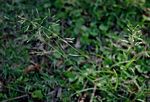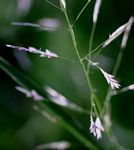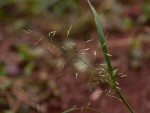| Home | > | List of families | > | Poaceae | > | Eragrostis | > | tenuifolia |
Eragrostis tenuifolia
Selected images: Click on each image to see a larger version and details of the record View all images (3)
Detailed records: Display species records QDS maps by: Google Maps Point records by Google Maps
Species details: Click on each item to see an explanation of that item (Note: opens a new window)
| Synonyms: |
Eragrostis collocarpa K. Schum. Eragrostis plana sensu B.K. Simon Poa tenuifolia A. Rich. |
| Common names: | |
| Frequency: | |
| Status: | Native |
| Description: |
Caespitose perennial without rhizomes or stolons; culms up to 70 cm tall, erect, strongly compressed below, unbranched, glabrous at the nodes, eglandular; basal leaf sheaths glabrous, firmly chartaceous, strongly compressed and keeled, eglandular or with punctate glands along the keel, persistent; ligule a line of hairs; leaf laminas 4–30 cm × 1–3 mm, linear, flat, thinly pilose, eglandular.Panicle 5–20 cm long, narrowly elliptic to narrowly ovate, loose and open, the spikelets evenly distributed on pedicels 3–7 mm long, these with or without an annular gland at about the mid-point, the primary branches not in whorls, terminating in a fertile spikelet, glabrous or pilose in the axils.Spikelets 4–16 × 1–1.5 mm (but opening out to 3 mm wide at maturity), linear, laterally compressed, 4–16-flowered, the lemmas disarticulating from below upwards, the rhachilla persistent; glumes unequal, barely reaching or shortly exceeding the base of the adjacent lemmas (the inferior never reaching as far as the middle, the superior sometimes doing so), keeled, narrowly lanceolate to linear-lanceolate in profile, glabrous, acute or rarely concave at the apex, the inferior 0.4–1 mm long, the superior 0.8–1.4 mm long; lemmas 1.7–2.5 mm long, keeled, narrowly semi-ovate in profile (with straight keel and gibbous margins), firmly membranous with ± distinct lateral nerves, appressed to the rhachilla at first, later widely diverging, those in opposite rows not imbricate, the rhachilla visible between them, dark green, glabrous, subacute to narrowly obtuse at the apex; palea persistent, glabrous on the flanks, the keels slender, wingless, scaberulous; anthers 3, 0.5–0.9 mm long.Caryopsis 0.9–1.1 mm long, oblong, strongly laterally compressed. |
| Type location: |
|
| Notes: | Spreading perennial grass, up to 70 cm. Inflorescence an open panicle. Spikelets laterally compressed. |
| Derivation of specific name: | tenuifolia: slender-leaved |
| Habitat: | Mostly found in disturbed and cultivated areas around human habitation, but also in riverine vegetation and moist grassland. |
| Altitude range: (metres) | 800 - 2300 m |
| Flowering time: | |
| Worldwide distribution: | Australia, India, Madagascar, New Guinea, South America (Colombia, Ecuador and Peru). Throughout tropical Africa, tropical Arabia |
| National distribution: | N,T |
| Growth form(s): | |
| Endemic status: | |
| Red data list status: | |
| Insects associated with this species: | |
| Spot characters: | Display spot characters for this species |
| Images last updated: | Saturday 5 April 2008 |
| Literature: |
Burrows, J.E. & Willis, C.K. (eds) (2005). Plants of the Nyika Plateau Southern African Botanical Diversity Network Report No. 31 SABONET, Pretoria Page 346. Chapano, C. & Mamuto, M. (2003). Plants of the Chimanimani District National Herbarium and Botanic Garden, Zimbabwe Page 24. Cope, T.A. (1999). Poaceae Flora Zambesiaca 10(2) Pages 82 - 83. (Includes a picture). Jackson, G. & Wiehe, P.O. (1958). An Annotated Check List of Nyasaland Grasses The Government Printer, Zomba, Nyasaland Page 40. Mapaura, A. & Timberlake, J. (eds) (2004). A checklist of Zimbabwean vascular plants Southern African Botanical Diversity Network Report No. 33 Sabonet, Pretoria and Harare Page 104. Poilecot, P. (2007). Eragrostis species of Zimbabwe Éditions Quae,Versailles, France Pages 86 - 87. (Includes a picture). Wursten, B., Timberlake, J. & Darbyshire, I. (2017). The Chimanimani Mountains: an updated checklist. Kirkia 19(1) Page 85. |
Other sources of information about Eragrostis tenuifolia:
Our websites:
Flora of Burundi: Eragrostis tenuifoliaFlora of Malawi: Eragrostis tenuifolia
Flora of Zambia: Eragrostis tenuifolia
Flora of Zimbabwe: Eragrostis tenuifolia
External websites:
African Plants: A Photo Guide (Senckenberg): Eragrostis tenuifoliaAfrican Plant Database: Eragrostis tenuifolia
BHL (Biodiversity Heritage Library): Eragrostis tenuifolia
EOL (Encyclopedia of Life): Eragrostis tenuifolia
GBIF (Global Biodiversity Information Facility): Eragrostis tenuifolia
Google: Web - Images - Scholar
iNaturalist: Eragrostis tenuifolia
IPNI (International Plant Names Index): Eragrostis tenuifolia
JSTOR Plant Science: Eragrostis tenuifolia
Mansfeld World Database of Agricultural and Horticultural Crops: Eragrostis tenuifolia
Plants of the World Online: Eragrostis tenuifolia
Tropicos: Eragrostis tenuifolia
Wikipedia: Eragrostis tenuifolia
| Home | > | List of families | > | Poaceae | > | Eragrostis | > | tenuifolia |


